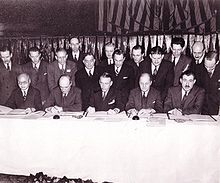Convention on International Civil Aviation
The Convention on International Civil Aviation, also known as the Chicago Convention, established the International Civil Aviation Organization (ICAO), a specialized agency of the UN charged with coordinating and regulating international air travel. The Convention establishes rules of airspace, aircraft registration and safety, and details the rights of the signatories in relation to air travel. The Convention also exempts air fuels in transit from (double) taxation.
The document was signed on December 7, 1944 in Chicago by 52 signatory states. It received the requisite 26th ratification on March 5, 1947 and went into effect on April 4, 1947, the same date that ICAO came into being. In October of the same year, ICAO became a specialized agency of the United Nations Economic and Social Council (ECOSOC). The Convention has since been revised eight times (in 1959, 1963, 1969, 1975, 1980, 1997, 2000 and 2006).
As of 2013, the Chicago Convention has 191 state parties, which includes all member states of the United Nations except Dominica, Liechtenstein, and Tuvalu as well as the Cook Islands. The convention has been extended to cover Liechtenstein by the ratification of Switzerland.
Some important articles are:
Article 1: Every state has complete and exclusive sovereignty over airspace above its territory.
Article 3 bis: Every State must refrain from resorting to the use of weapons against civil aircraft in flight.
Article 5: The aircraft of states, other than scheduled international air services, have the right to make flights across state's territories and to make stops without obtaining prior permission. However, the state may require the aircraft to make a landing.
Article 6: (Scheduled air services) No scheduled international air service may be operated over or into the territory of a contracting State, except with the special permission or other authorization of that State.
...
Wikipedia

